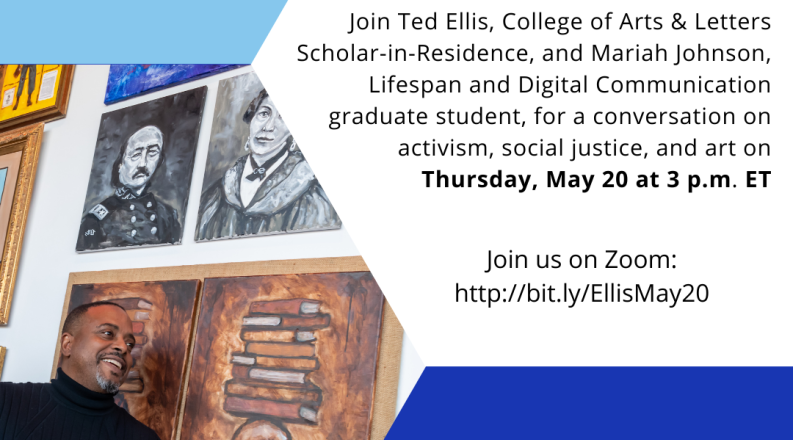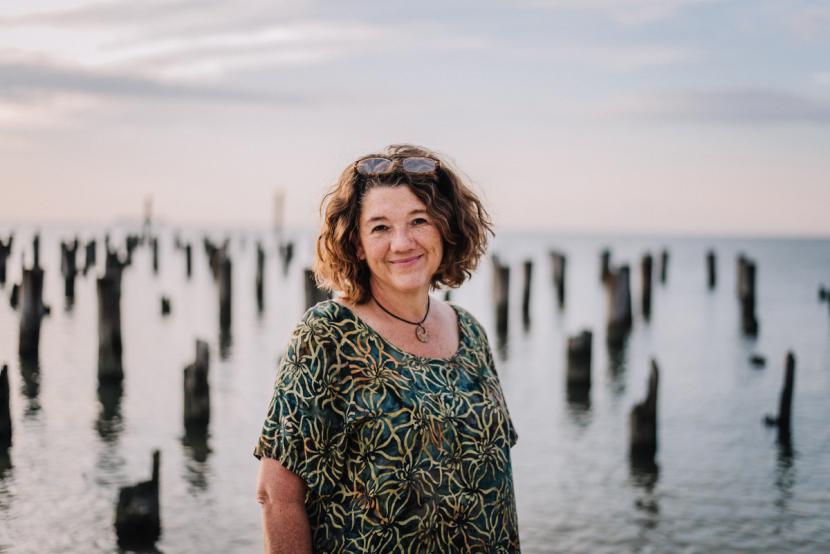By Amy Matzke-Fawcett
Ted Ellis, famed self-taught artist, educator and cultural historian, is serving as Scholar-in-Residence for Old Dominion University's College of Arts and Letters. Since he began his appointment began in January, Ellis has worked with groups across the University to highlight the value of the arts, specifically visual literacy, in efforts to understand the resilience and contributions of African Americans.
The appointment continues Ellis' relationship and diversity work at the University and in Hampton Roads. In January 2020, Ellis traveled to ODU to debut a show developed exclusively for the University on race, social justice and African American culture in the United States over the past 400 years. It featured more than 20 original paintings that speak to the experience and history of African Americans as part of the University's 400th commemoration of the first African landing.
A live Zoom conversation with Ellis, part of an online series on art and social justice, will take place at 3 p.m. May 20. Ellis and Mariah Johnson, a lifespan and digital communication graduate student, will discuss activism through art. The event is free and open to the public.
The College of Arts and Letters spoke with Ellis about his work, his plans and hopes for the residency, and his work combining African American history, culture and art.
Q: How did your partnership with the University start?
A: Having the privilege of meeting Dr. Melvina Sumter (associate professor of sociology and criminal justice and director of the Institute for the Study of Race and Ethnicity) at the inaugural 1619 event at Fort Monroe (in August 2019), I was extended the opportunity to showcase my art at ODU. For the past 25 years, I have had the opportunity to exhibit at different schools, colleges, universities and corporations, engaging students, faculty and community with my art exhibition and discussions.
Q: In 2018 you were named vice chair of the 400 Years of African American History Commission, which included outreach and programming geared at educational institutions, including ODU. How did that experience inform your outreach work?
A: The 400 Years of African American History Commission was created in part to recognize and commemorate the contributions, activities and achievements of African Americans since the arrival of enslaved Africans from 1619. Academic institutions have an especially important role in teaching and preserving history and passing it on to future generations.
Q: What do you hope to accomplish as a Scholar-in-Residence?
A: I really want to be part of the big solution, to continue to make education a high priority and to use it and art as a primary resource and a catalyst for student and community engagement, stimulating discussions about racial injustice, equality and the importance of freedom in the United States. Promoting diversity and inclusion as a core organizational strength is big part of the goal. Working along with groups across campus, such as Intercultural Relations, the Department of Art and many others. We will continue to build and augment sustainable programs for racial equity and social justice initiatives.
Q: You recently finished a master's degree in museum studies at Southern University in New Orleans. How does your recent experience as a student inform what you will do as Scholar-in-Residence?
A: Museums and academic universities are knowledge-driven institutions. Each provides a methodology of sharing information for enlightenment purposes. They are the best places for students to grow and learn about environments and communities. My years of working in partnership with both institutions is well suited for the Scholar-in-Residence appointment.
Q: You've often spoken of your love for art and how it can teach about equality, history and specifically African American culture. What do you hope people in Hampton Roads and beyond take away from this partnership?
A: For everyone to continue to realize the historical importance of this area, the political, social and economic impact that it has had on the United States as a whole. Slavery began in Hampton, Virginia. Hampton Roads was the end of slavery and the beginning of freedom for those who were enslaved. The policies and laws that ended slavery continue to make America the land of promise for all, and we must continue to fight injustice here and everywhere. Hampton Roads is on the right side of history. And ODU continues to take an active role in what is right for the sake of humanity.
A virtual tour of Ellis' exhibition is available on the Arts@ODU website.
To hear directly from Ellis, follow the College of Arts and Letters on Instagram for a series of live events, as well as the Zoom conversation on May 20.
Related News Stories
College of Arts and Letters Student Wins Alumni Association’s Outstanding University Scholar Award
Music education major Timothy Burleigh earns top academic honor; Kaufman and Evon-Broderick award winners also announced. (More)
ODU Alum Drumming Up Support for Documentary
Trevor Banks ’09 is using crowdfunding to complete his film about Clyde Stubblefield, the former drummer for James Brown. (More)
English Department Chair Sheri Reynolds Publishes Seventh Novel
“The Tender Grave” explores a hate crime, a dysfunctional family and the quest for redemption. (More)






